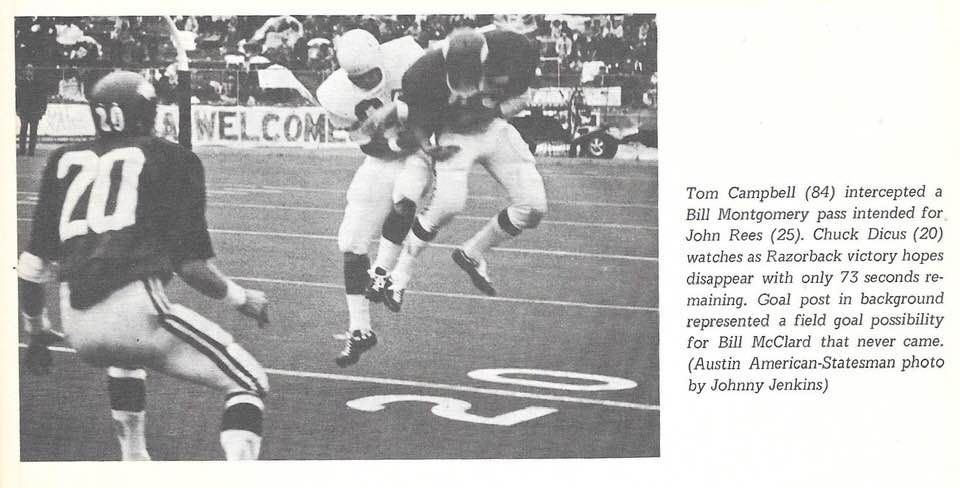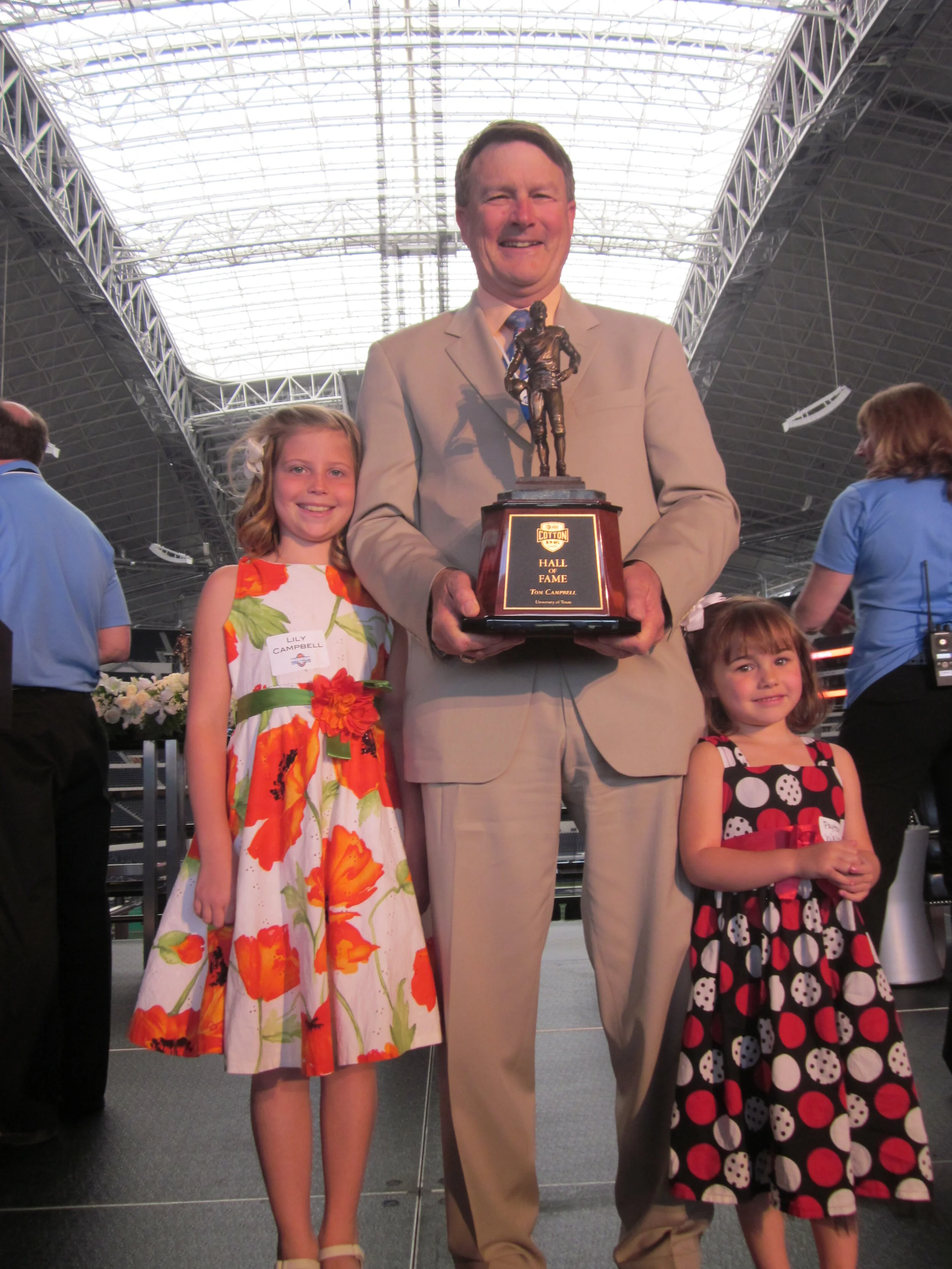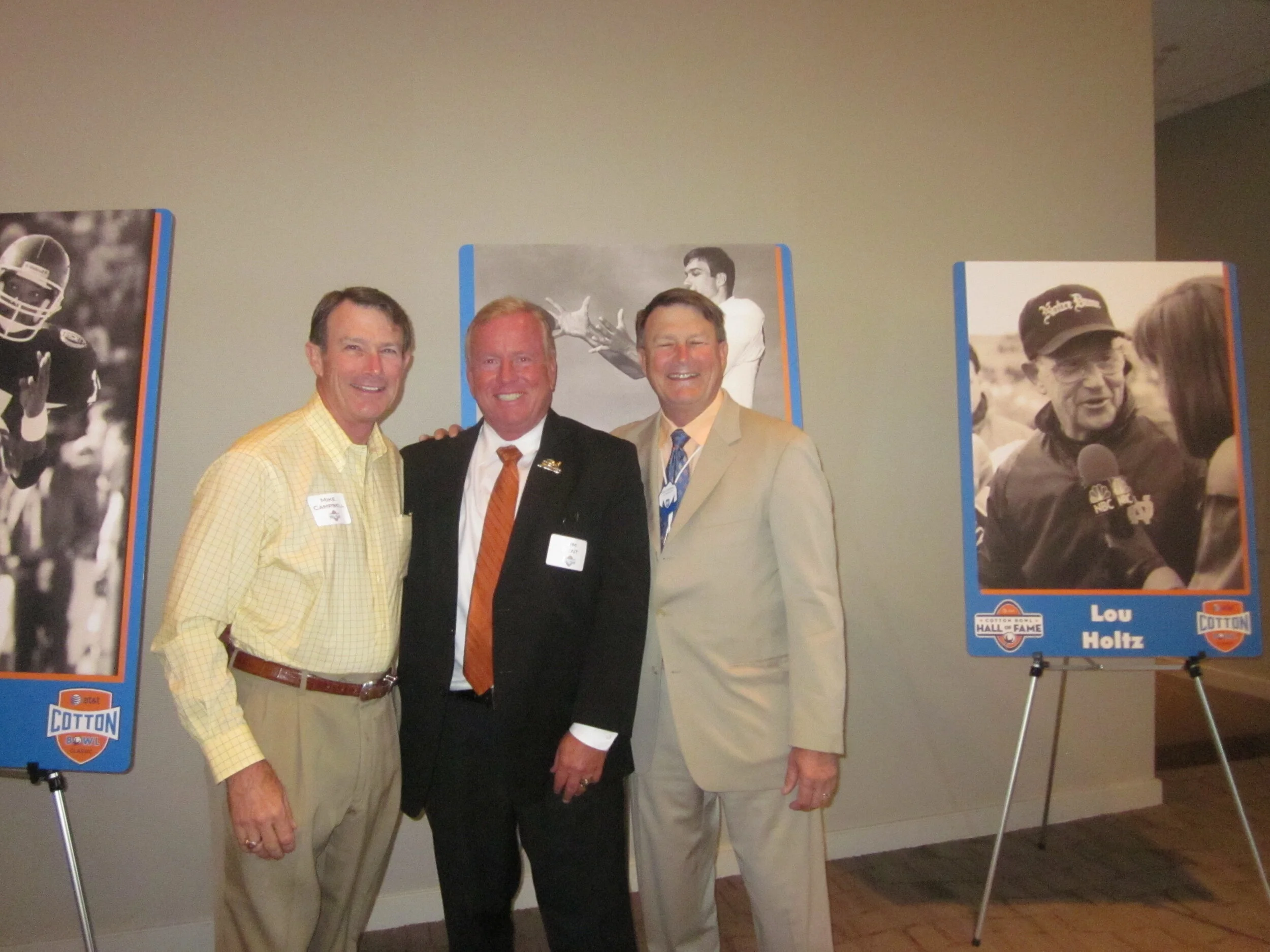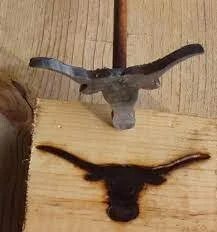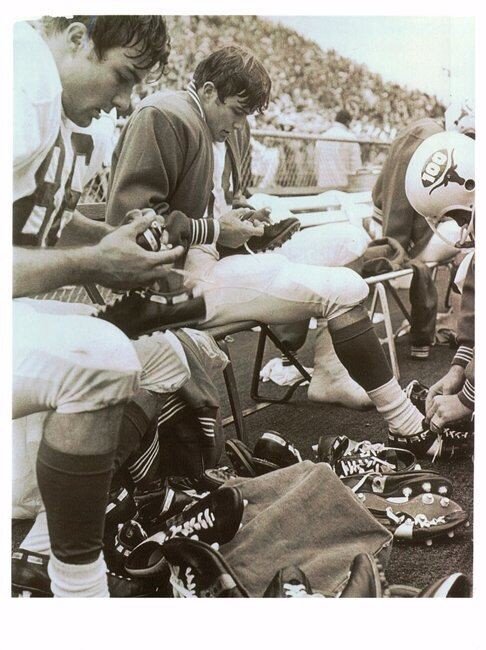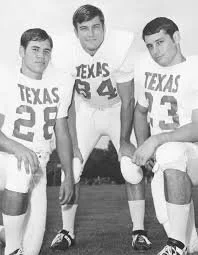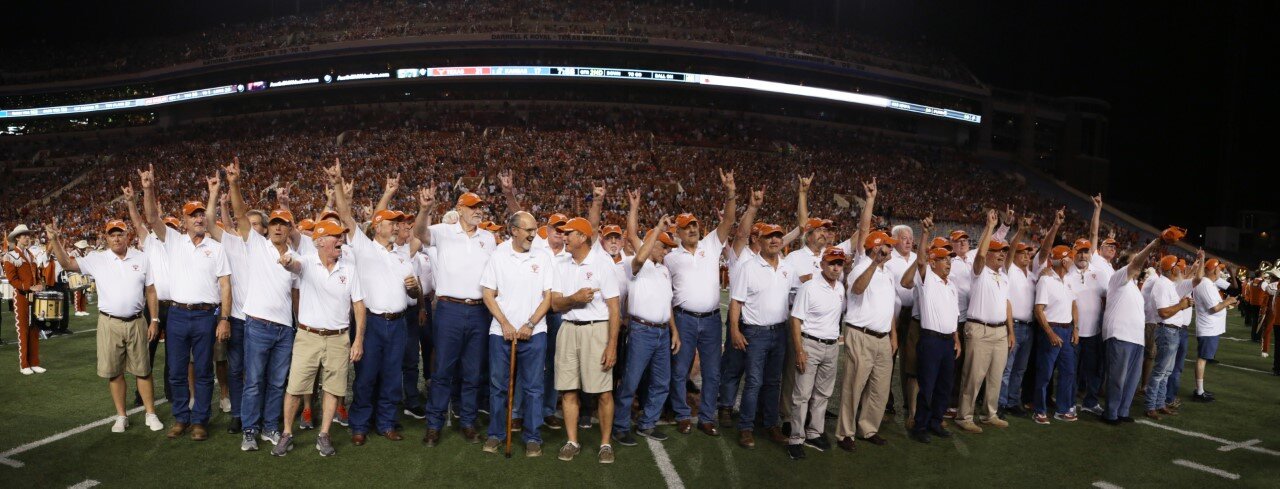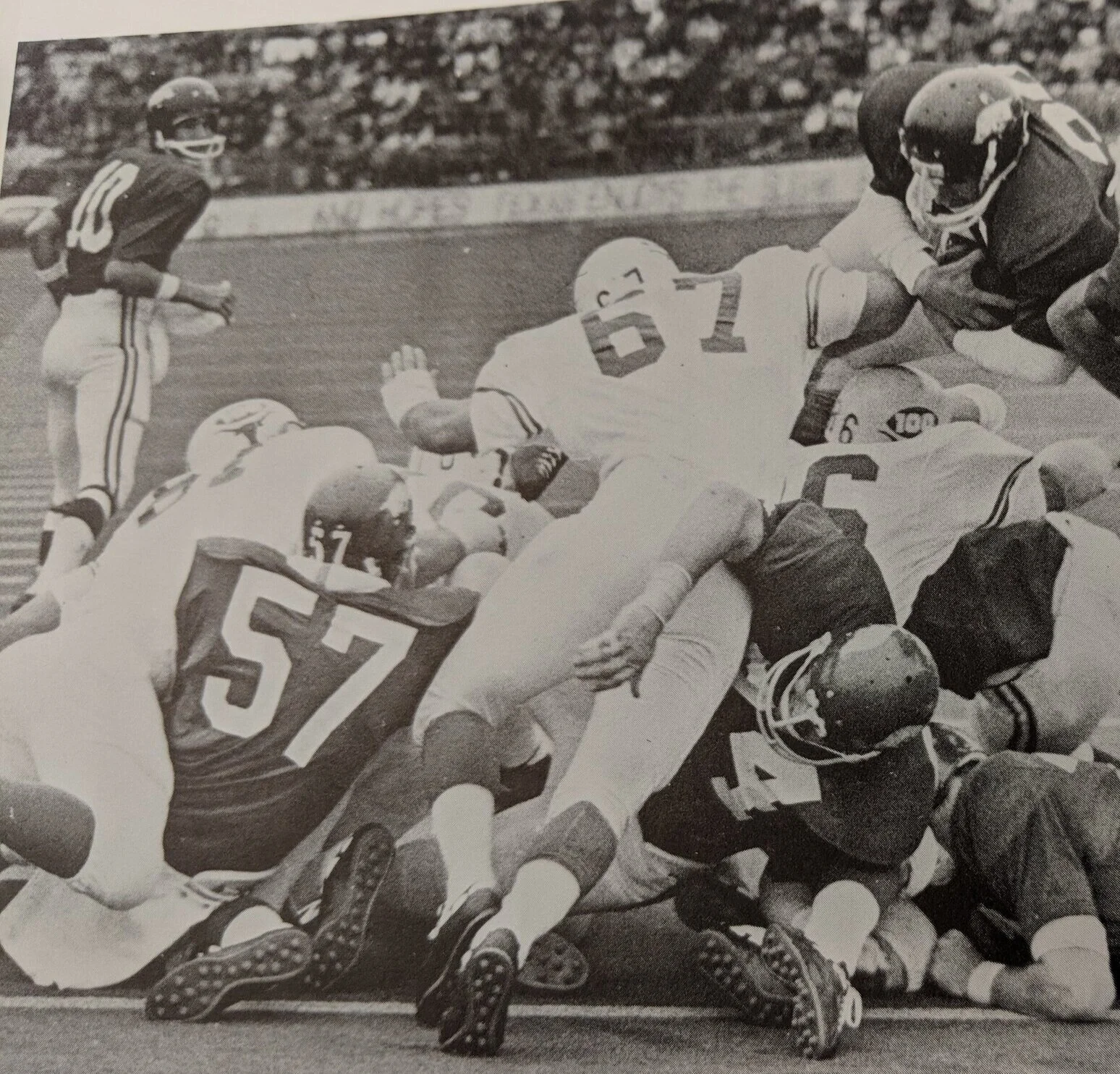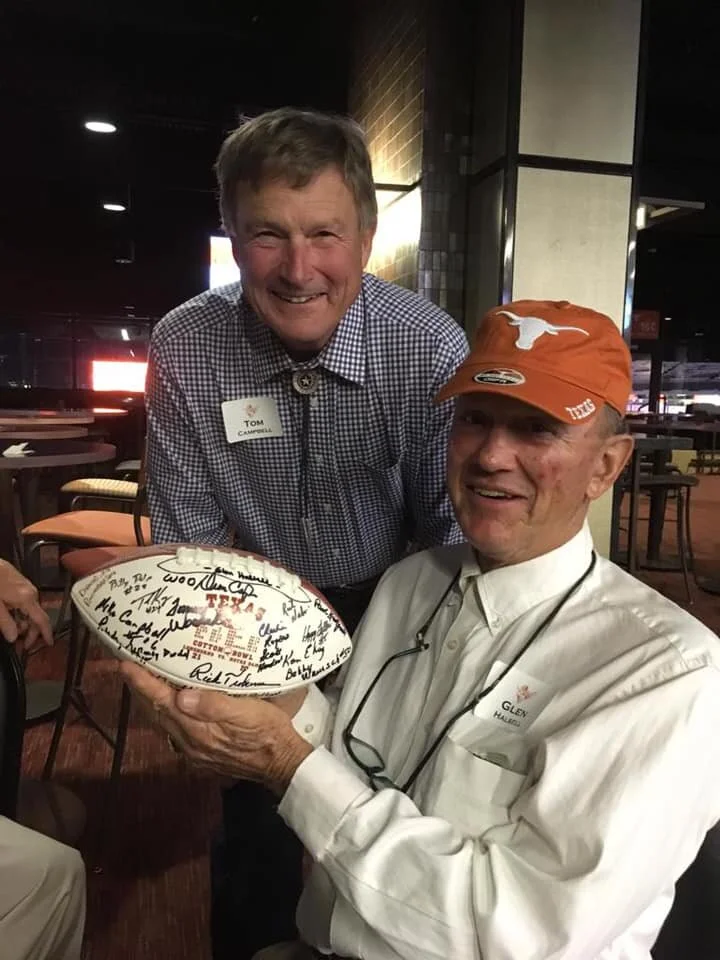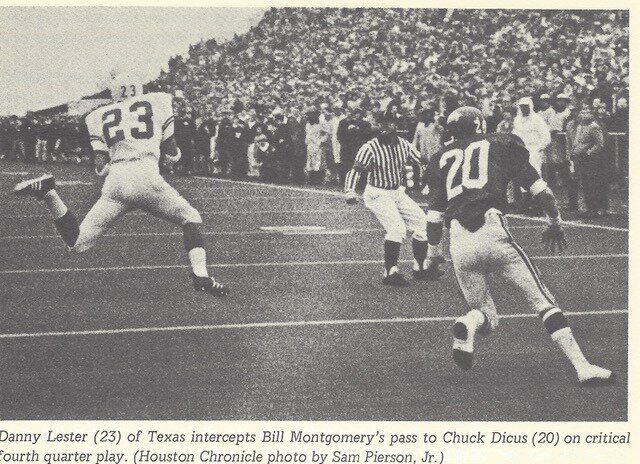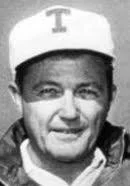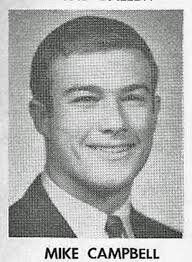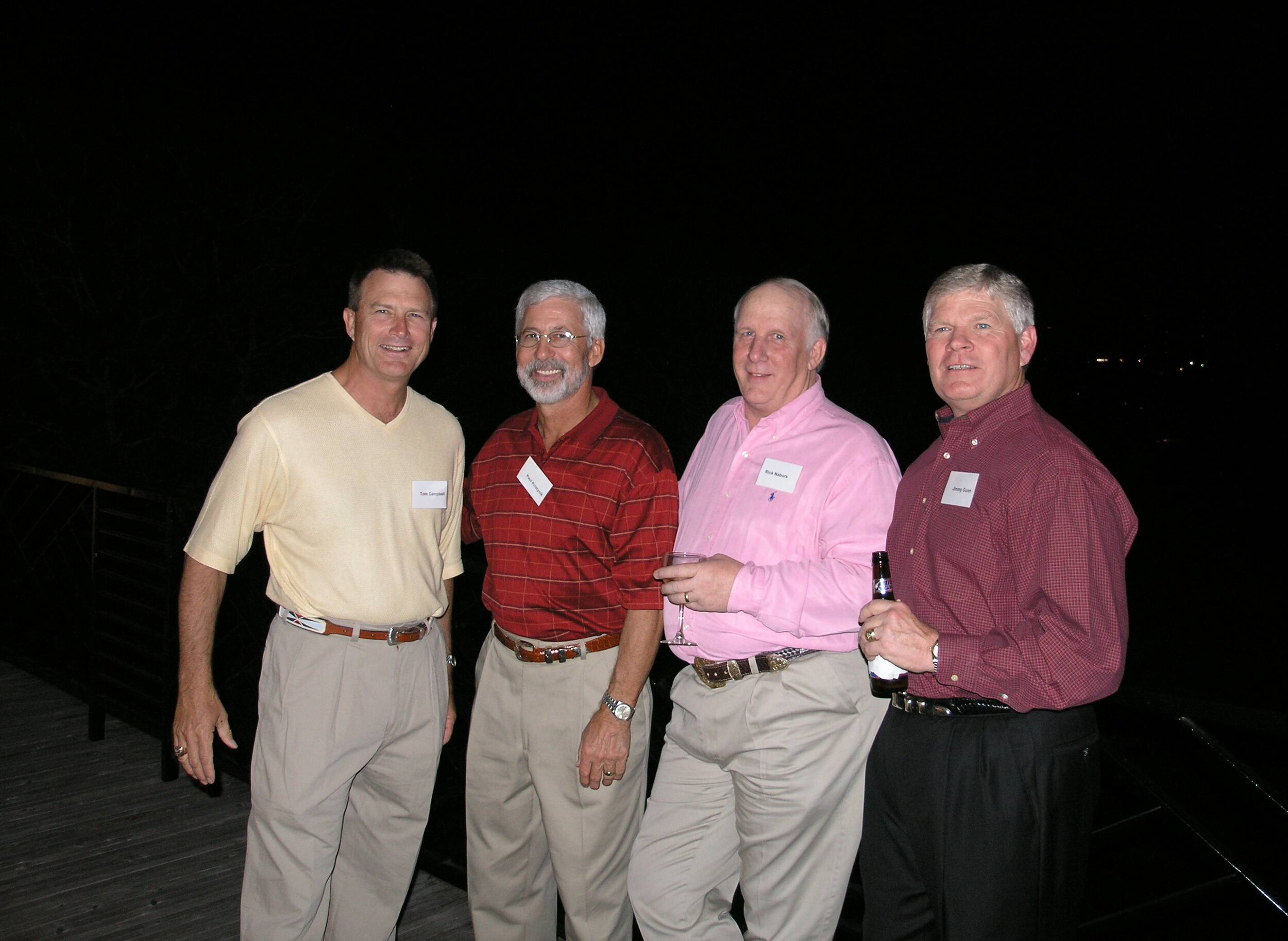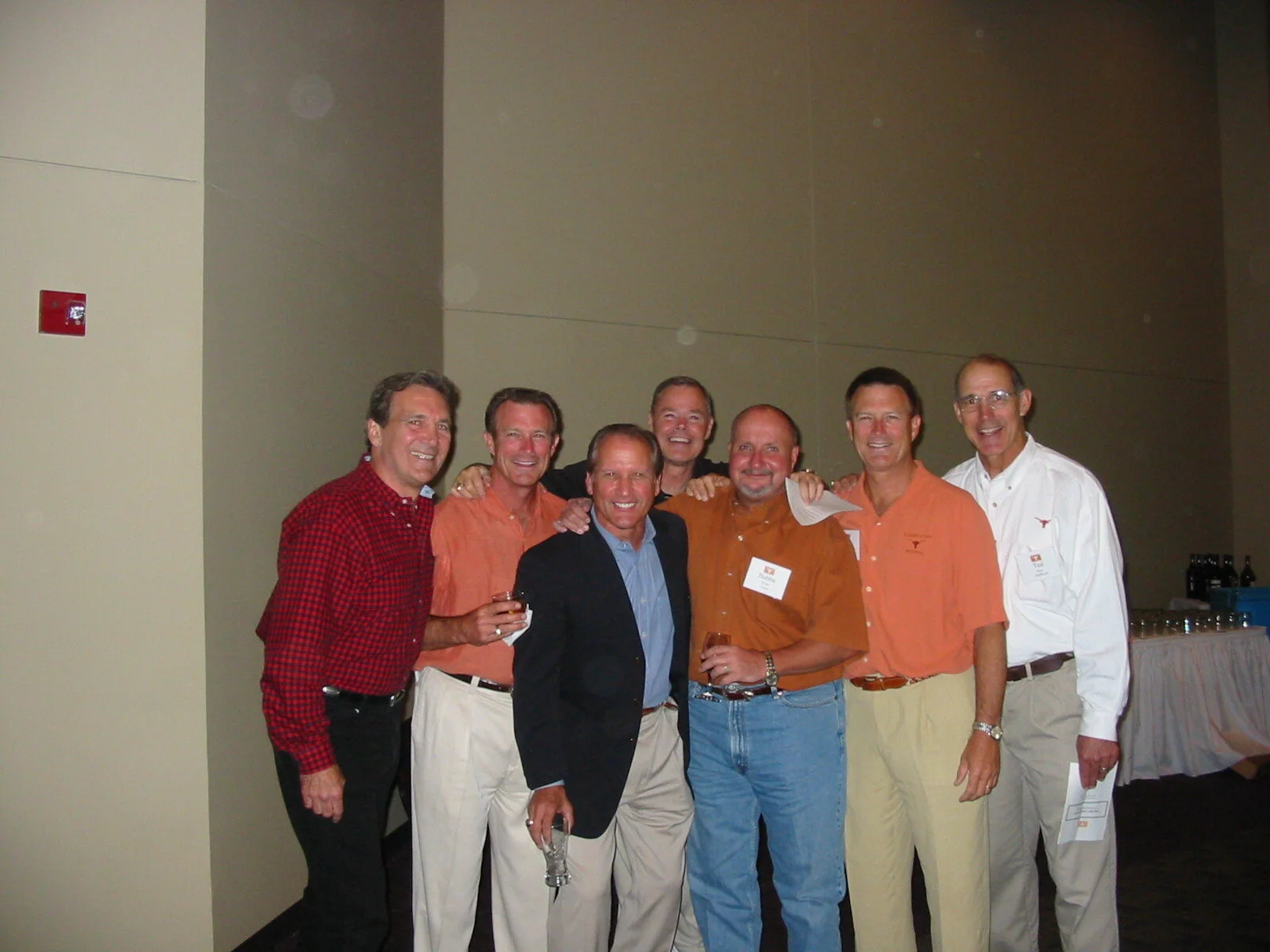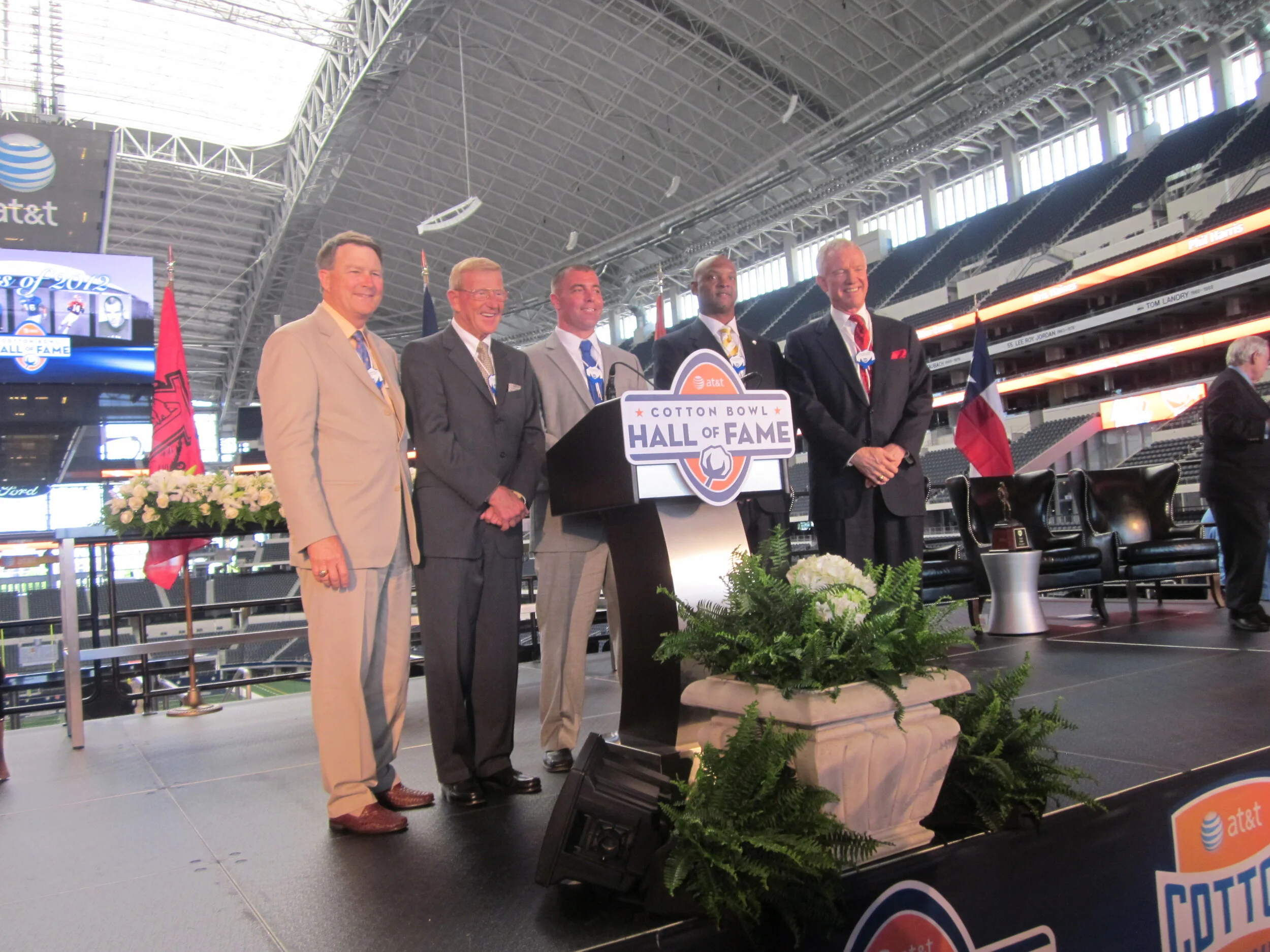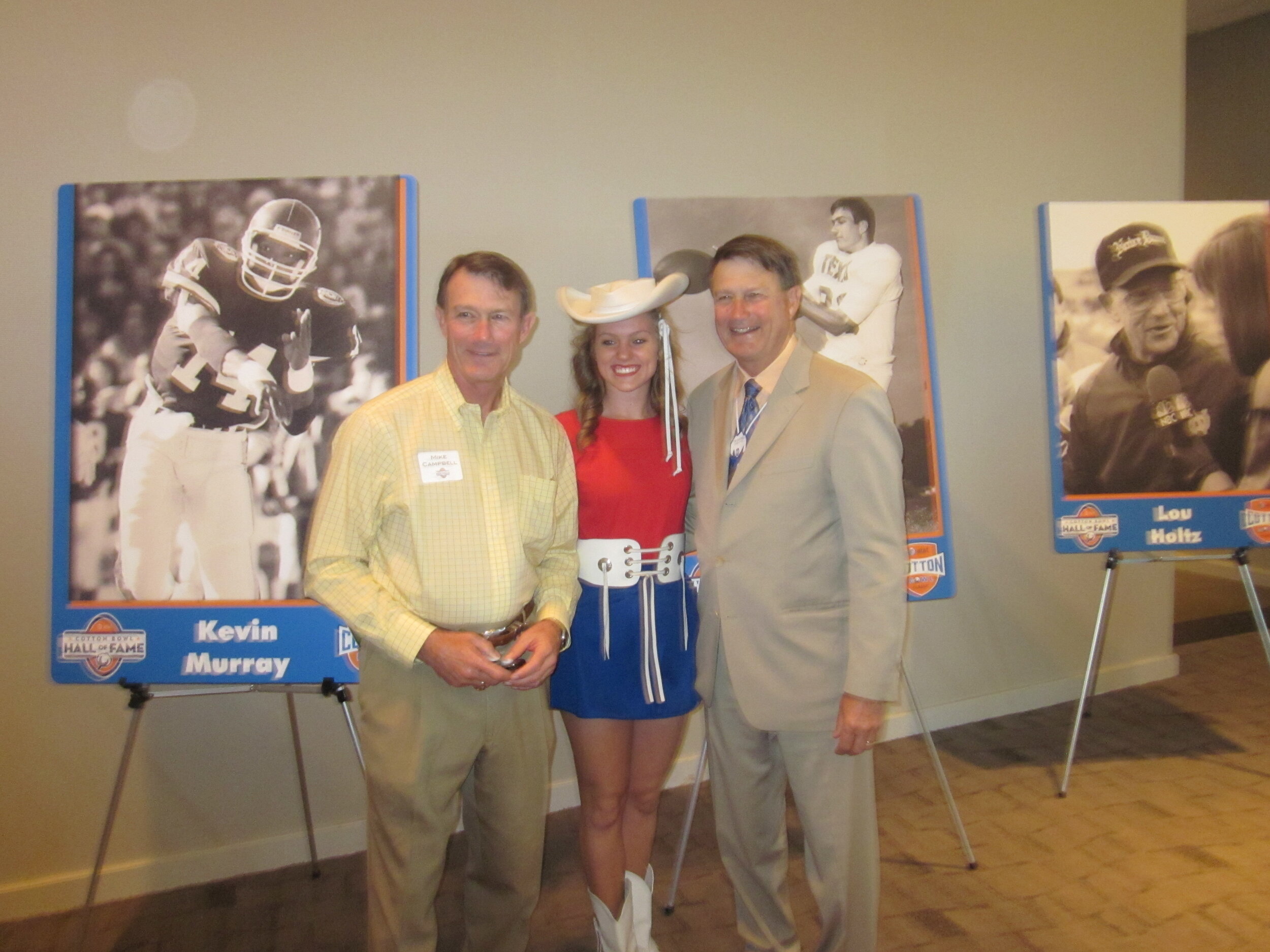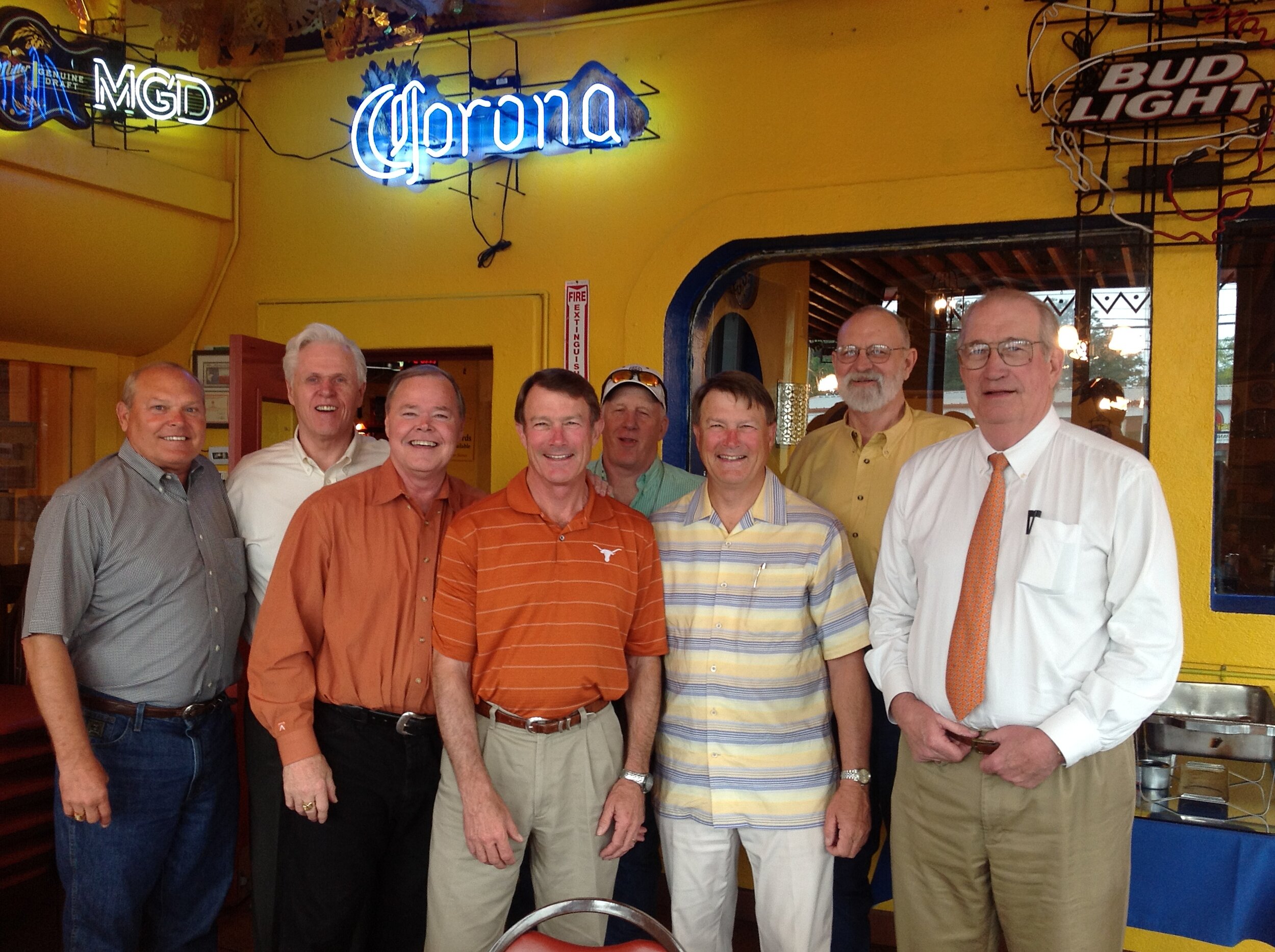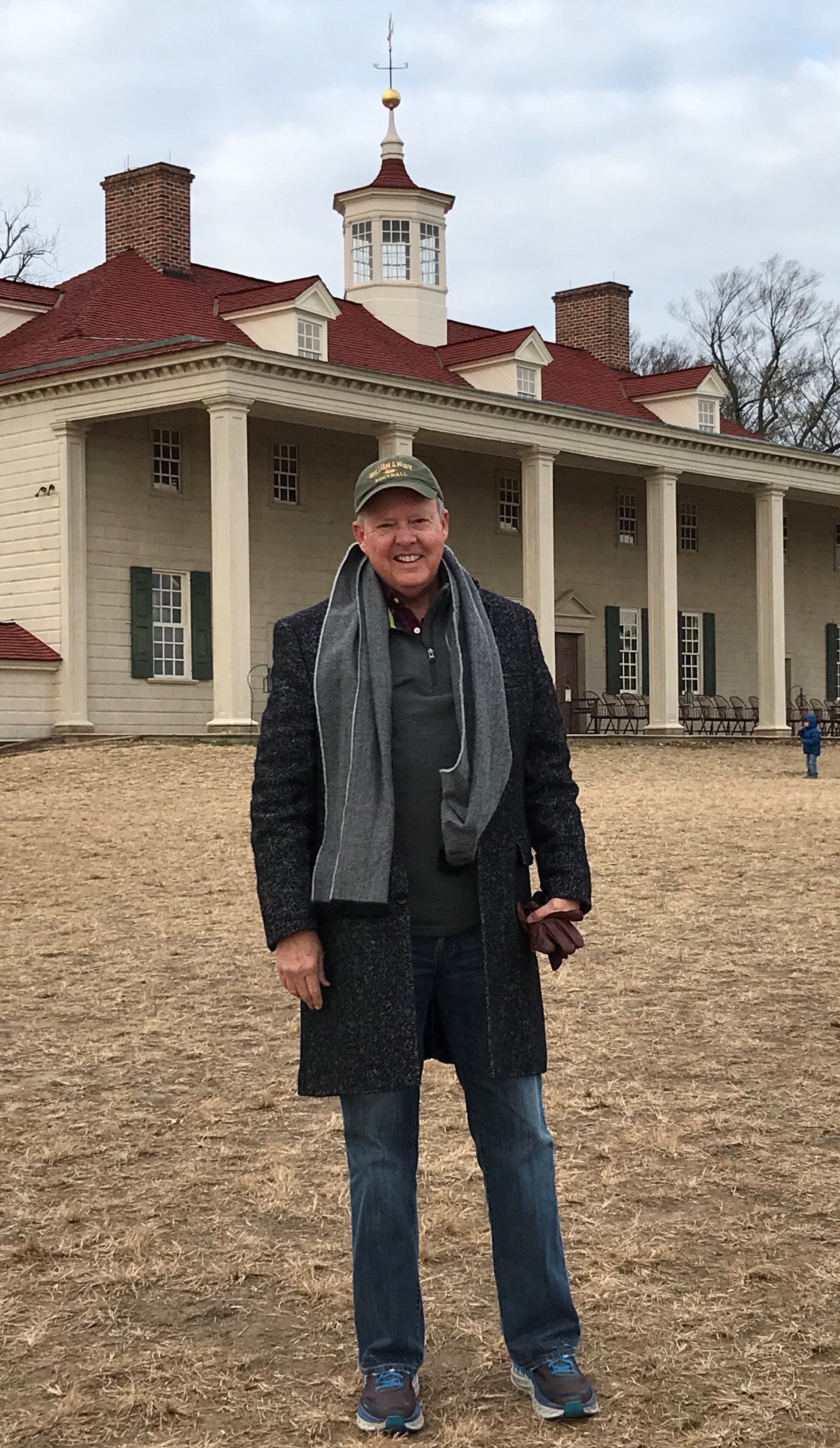Tom Campbell Cotton Bowl Hall of Fame Recipient
Timely Tom: UT Football’s All-Time Closer
by Larry Carlson
It has been more than a half-century since Tom Campbell closed his career at Texas with a flourish unmatched in Longhorn lore. The former walk-on intercepted passes that extinguished the last hopes of Arkansas in 1969's Big Shootout and then did the same to snuff Notre Dame in UT's stirring win that cemented the national title.
Tom (right) and Mike Campbell with acclaimed sports author Jim Dent. Lou Holtz was also in Tom Campbell’s Cotton Bowl Hall of Fame class.
Son of the greatest assistant coach ever at Texas, twin brother of another rugged Horn defender, and older brother to a member of the '70 national champs, Campbell ended his burnt orange playing days on a 20-game roll. Tom's heroics were hardly limited to two games. But for one man to own two of arguably the three biggest interceptions -- the other being Duke Carlisle's endzone save in the final minute against Baylor in '63 -- in more than 125 seasons of Longhorn football is remarkable.
Campbell, a member of the Cotton Bowl Hall of Fame and the UT Hall of Honor, repeatedly displayed the determination, skill, and savvy to be in the right spot in crucial moments. He still receives queries from fans and media members who never lose the hunger for more tales from an era that chiseled Texas into the Mount Rushmore of college football's larger-than-life programs.
TOM CAMPBELL - " A LONGHORN BRAND BUILDER”
Number 84 took time to illuminate TLSN with details on a Dad who was tough, a Mom who was tougher, Darrell and Willie, legendary teammates, and Madden the man, not the video game series.
Larry Carlson interviews Tom Campbell on 7/04/2021
We wore special shoes with short rubber cleats when playing on Astroturf. However, they were no good on wet Astroturf. To make matters worse that day in Fayetteville the field was splotchy with wet and dry areas. However, our regular grass shoes were not good on Astroturf. Mike and I decided to go with the metal cleats for grass. We had left our metal cleats under the bench and when we went to get them they were gone. Managers had gone through our benches picking up shoes players had discarded when they made their choice and put them in several duffelbags. Fortunately our shoes had our numbers on them so next thing managers were frantically looking for ours through several dozen shoes. They finally found them but the 2 shoes had been tied in a seriously good knot. The photo is us trying to untie the shoes and hoping the offense could get a first down to give us time. As you can see if we had had to go onto the field during that time we would have had a big problem.Whatever it is, the way you tell your story online can make all the difference.
TLSN: Growing up with your Dad heading UT's defense for Darrell Royal, who were some of the players you looked up to or idolized?
Tom: A couple of my Dad's favorites were Scott Appleton and Tommy Nobis but I can't say that I ever had any favorites.
TLSN: When you and Mike later walked on at Texas -- with your Dad as your defensive coordinator -- how daunting was that, all the way around? I know you are on the record about having to fight some teammates who considered you and Mike "coach's sons" while you slowly climbed the ladder from "tenth string," according to Jim Dent's book about Freddie Steinmark, "Courage Beyond the Game."
Tom: Mike and I were not recruited by anyone. Daddy knew the coaches at Ole Miss because of his high school caoching in Mississippi and playing at Ole Miss. His good friend Charlie Shira was the head coach at State and Shira had come from Mississippi with DKR when they went to U of Washington. We were hoping that one of those schools would offer us a mercy scholarship. We were just average high school players and didn't expect to be recruited. Shira told Daddy that if we wanted to come to Mississippi State he would get us a job working in the Athletic Dining Hall. Daddy told us " I can get us that job in the UT dining hall so it looks like you are going to UT".
This was actually in the summer before our high school senior year. There was never any talk about us walking onto the team when we got to UT. After our senior year at Austin Reagan, as expected, no one recruited us so we were just going to UT and be students. Mike and I talked it over and decided we wanted to walk-on. One night Daddy came home and we told him that since we were going to UT we decided that we wanted to walk on. He looked at us and said "have you two lost your minds?!" A few weeks later, after signing day he came home and told us that Darrell said he had 2 scholarships left over and we could come out and stay as long as we wanted.
There was never a pience of paper put in front of us to sign as a committment, however. There was never any expectation that we would hang around long so there was nothing daunting about it since we were so low on the roster. Mike and I had short tempers and there was no question that if anyone ever accused us about being there becasue of being a coach's son we were readyto fight about it. Yep, we had a couple of fights and they were always with guys bigger thn us. We always held our own.
For all practical purposes, on the practice field we were treated just like the other walk-ons but we did get to live in the dormitory and eat in the dining hall. Most walk-on's only last a year and then quit. We never did quit. Never considered it. When we checked into Moore-Hill Hall as incoming freshmen, our Mother drove us and dropped us off. We never considered quitting because she gave us the best motivational speech anyone ever gave. She said to us as we got out of the car, "Boys, don't quit because you can't come home". We knew that she meant it and we knew she was tougher than our Dad. Mama was daunting to us, not Daddy.
1969 Starting defensive backs - Steinmark, Campbell, Lester
TLSN: Your Dad was famously a defensive genius, a demanding coach, a man who threw compliments around as if they were manhole covers....but who appreciated his players and had a wry sense of humor. Did teammates ever gripe about him to you and Mike, and what was the story behind Longhorn players referring to Coach Campbell as "Bloody Mike?"
Tom: Actually, his nickname was "Iron Mike", not Bloody Mike. My mother was Bloody Mary. I think it might have been Diron Talbert (UT '64-'66) who came up with those names. There were a couple of times when, after a tough practice and he was particularly hard on us a player would come up to us and ask us how we managed to live with him for 18 years. Mike and I would look at them and say, that was nothing, you ought to see our Mother in action.
(Editor's note: I've known former players who always referred to their defensive leader as "Bloody Mike" when discussing their playing days. So I called a friend who played for the Horns and asked him about it. His response:"Coach Campbell was affectionately referred to as both "Iron Mike" and "Bloody Mike" by players, but the Campbell brothers always said 'Daddy was Iron Mike and Mama was Bloody Mary,' Coach was universally respected and revered by all, regardless of the moniker.")
TLSN: In the Cotton Bowl your junior year, you had two picks and were named Defensive MVP, with Texas destroying a good Tennessee team, 36-13. Was that as complete a game as the Horns played when you were there, and did it lead to a special feeling going into what would become a national championship year in '69?
Tom: Yes, it did, but we knew that we lost some really good football players who graduated, and who was going to replace them? Most of us agree today that the '68 team was probably better than the '69 team, particularly because of the defense. Nevertheless, we started the season ranked 2 or 3, and we had big expectations. However, we never focused on #1 because Ohio State had won it in '68 and was really good in '69. We pretty much felt like we were playing for #2 and wanted to be unbeaten. In '68, I was actually the left outside linebacker. I started the season on the second team. Mike Perrin (later the Interim Athletic Director at UT from December 2015 until Chris Del Conte took over full-time duties two years later) should have been the starting left outside linebacker, but he had gotten his knee destroyed against TCU the year before and just lost his mobility. Another player started the '68 season at #1, and I was second team. It was never my goal to be first team. Mike and I never dreamed we would play, but midway through the '67 season, our sophomore year, we both got promoted to the 2nd team. My goal in '68 was to keep my #2 position at left outside linebacker. Mike was the second team right outside backer behind Corby Robertson. In our first game in '68 against Houston, I played a few plays, not many. When I came into the locker room on Monday after the Houston game, I found that I had been promoted to the first team. I thought there had been a mistake made on the depth chart and actually went up to my Dad and questioned him about it. He looked at me and said, "You don't think you're good enough?!
TLSN: Fast forward to the Big Shootout in Fayetteville in December '69. Arkansas was unusually well-balanced with standouts such as QB Bill Montgomery, receivers Chuck Dicus and John Rees, RB Bill Burnett, etc. How much pressure did that put on you and the guys in the secondary?
Tom: We had plenty of confidence that we could handle them. I was very comfortable by then at defensive back and looked forward to going up against Dicus. People have never discussed that Arkansas came out with an offense that we had never seen. They put two wide-outs on the same side rather than one on each side. It created a huge problem for us. In our defense, the defensive halfback (me and Danny Lester) would always be covering the widest player. The Rover would be responsible for the second guy, who would always be the tight end. But Arkansas came out with Rees as the wideout, either to the left side or the right. But, they put Dicus on the same side as Rees but in the slot. That meant that our Rover, Mike had to cover their best receiver, Chuck Dicus. Besides that, our Dad, early in the game, realized that Montgomery had too much time to throw the ball. We weren't getting any pressure on him so he decided that we needed to leave our zone defense and play man-to-man so we could rush an additional linebacker. The problem was that Mike had to cover Dicus man-to-man all over the field. One of the very best and fastest receivers in the country was now being covered one on one by our Rover, Mike. Next thing you know, we were down 14-0. That's when Mike told Daddy that he could not cover Dicus all over the field but could do it in a zone. We played the rest of the game in a zone defense, and they did not score again. Although, they did have another TD called back because of a penalty which would have made it 21-0. In the first half. After this, Mike told Daddy that we needed to return to the zone defense.
TLSN: What do you recall about the bus ride to Razorback Stadium, the atmosphere there and the team's pre-game mood? A lot of Texas fans expected another blowout win like the ones against the rest of the Southwest Conference teams, but it didn't quite go that way...certainly no thanks to four lost fumbles by the Horns' offense.
Tom: We were very confident based on the results from the year before (UT led 39-15 before UA added two late "garbage" TDs in the '68 matchup). The weather was very overcast and ominus looking. The Raxorback fans really gave it to us as we got close to the stadium but we were used to this type of thing. Neverthesess, #1 v #2, last game of the season, Nixon coming to the game certainly added to the atmoshere. I wouldn't say we were nervous.
TLSN: Gotta ask this....how distracting had it been that the military draft lottery for the war in Vietnam coincided with preparations for Arkansas?
Tom: I don't think the lottery had any impact on us. Also, we had no idea what was going on in Fayetteville with the (anti-war) protesting that was planned. The documentary, The Big Shootout, Life and Times of 1969, shed a lot of light on all of that. We never knew that stuff was going on. Nevertheless, starting with the huge pep rally a couple of night before, we knew that this was something special but it didn't make us worried or nervous.
READ ABOUT TOM CAMPBELL AND THE TURD BOWL AT THE LINK BELOW.
https://texas-lsn.squarespace.com/the-rise-and-of-dkr-recruiting-and-race
TLSN: A while before your late interception sealed the wild comeback victory, Steinmark was beaten deep by Dicus and wisely grabbed his jersey, drawing an interference call but saving a touchdown. In hindsight, did you realize that Freddie seemed at least a step or two slower that game?
Tom: I had no idea, and in fact, I never knew that he had been going into the training room for treatment before practices. He was never late or missed a practice. After the penalty and we were in the huddle with the ball on the 7-yard line, I turned to say something to Freddie. But it wasn't Freddie, it was Rick Nabors, his backup. I had to yell because it was so loud. I yelled at Rick, "What are you doing in here?" He said, "I don't know, the coaches just told me to get in the game."
TLSN: You were Cotton Bowl MVP against Tennessee as a junior, you had a key interception against OU in a tight game the next October, then you slammed the door on Arkansas and the Irish in the final two games of your career, two of the biggest moments in Longhorn football history. You've shared that your Dad acknowledged your big-game prowess in a private moment after that Notre Dame game. You said his comment was something like, "Tom, I don't know what you're going to do with the rest of your life...but you ought to do it on television." He was spot on. Were you somehow burning a higher mental and physical octane in those higher-stakes games, the only ones televised back then?
Tom: No, it was just one of those things that kept happening. However, when the other teams got into a situation where they had to throw the ball, it created more opportunities. I have occasionally thought that Tennessee, OU, Arkansas, and ND may have picked me out as the weak link back there.
TLSN: You've got a pretty good story about not getting a second straight Cotton Bowl Defensive MVP award after the Notre Dame game.
Tom: Charlie Fiss, the Director of Communications for the Cotton Bowl, told me several years ago that they would have voted me defensive MVP a second time after the (Notre Dame QB Joe) Theismann interception but they had already taken the writers' votes in the press box before my interception. I told him, "Charlie, the game lasts 60 minutes, not 59 (laughs)."
TLSN: Your middle linebacker, Glen Halsell, was an All-American in spite of being about 5-11, 205, I've been told that he had tacit approval from the coaches to basically forego the defensive game plan and just go to the ball because that's what he could do best. What in particular do you recall about Halsell?
All American Glen Halsell #67
Tom: Daddy's nickname for Glen was "a rolling ball of butcher knives." As a linebacker, he was always going to the ball. I'm not aware that he deviated from the game plan. Pertaining to Glen's size, I wouldn't say that in the 1960s, he was undersized. He was a lot bigger than Pat Culpepper (5-9, 182 for UT in '60-'62) and was probably average in that decade. Glen could get to the ball carrier in a hurry and went in a straight line with an attitude. There were rare guys like Nobis (6-2 230) but that was unusual. My Dad preferred speed above all but a player had to be able to go side to side, not just straight ahead. Glen could do it all. But there was no question that Daddy liked size and speed, but if you didn't have speed, he didn't care how big you were. My Dad could evaluate players, and he didn't look at the size, he would look at what they could do on the field. In high school, he watched films of Bobby Mitchell (FB/LB who was converted to OG at Texas and made All-SWC) and noticed this other kid (Freddie) making plays all over the field. That's how Freddie got invited to visit UT.
All-American Glen Halsell with Tom Campbell in 2019 at the 50th reunion of the 1969 national championship team.
TLSN: There's been a lot discussed since the Shootout about how the Arkansas players were still very sportsmanlike in spite of the devastating defeat. On the other hand, Notre Dame, your opponent in the Cotton Bowl a month later, has been widely criticized by more than a few Longhorns who were almost astonished at the conduct of the players, coaches, and personnel of the Irish. Many Texas fans have heard your story about being cussed and verbally abused by ND coaches and even a sideline priest and how your brother Mike was able to sneak a middle finger to them in response, utilizing a ref's back as a shield. Any other recollections that contrast the Arkansas team with the Notre Dame crew?
Tom: That pretty much nails it about Notre Dame. We knew going into the game that they would try to intimidate the opponent. We saw on film how after a play, they would go out of their way to push you going back to their huddle. We were prepared for that. After the first few plays, they quit doing that because we were ready and pushed back. At the awards dinner that night after the game, I got there late and ended up sitting at a table with ND players who were all good guys.
TLSN: Like Glen Halsell and Freddie Steinmark, many Longhorn defensive players were not big during your Dad's two decades at Texas with DKR. Can you name a few guys who earned special respect from teammates and from your father?
Tom: Honestly, we were not that undersized. We recruited big guys all the time, but our coaches could evaluate players; if someone was a little smaller, it was not a problem. Freddie seemed smaller, but my Dad started him as a sophomore. He only started sophomores very seldom, and it was always someone who was exceptional, like Nobis or Halsell. Or Steinmark. DKR had a rule that he would lose a game for every sophomore that he had to start. If they had to start a sophomore who was not a Nobis, it meant they had a bad recruiting year.
Defense won the National Championship for the Longhorns in 1969. If Tom Campbell and Danny Lester do not make timely interceptions in the Arkansas shoot-out there is no National Championship and the media’s celebration of the great Wishbone offense would have been muted.
TLSN: Was there anybody on the '68 or '69 teams that you would've traded places with for a day or two because of their on-or-off-the-field lives back then?
Tom: No. I was living a fairy tale myself. My goal as a freshman was that by the time I was a senior, I would get to wear a uniform and sit on the bench during games. When I got promoted to the second team in my sophomore year, my goal changed so that I would never get demoted to the third team. It was never to become the first team.
TLSN: When Coach Royal retired in '76, he recommended your Dad for the head coaching job. Some of the regents decided to override DKR's wishes and go in a different direction with Coach Akers. Just how hurt and disappointed was Coach Campbell to then also retire from coaching but still dedicate his life and work to the UT Athletic Department?
Photo -Iron Mike-
Tom: I wasn't in Austin in '76, but I knew that he was very upset. He turned in his office keys the day he heard they hired Akers. He was through with coaching. He actually told me once that it was the best thing to ever happen to him, not getting the job. He went to work for the State of Texas Teachers Retirement System, and it was the first time in his life that he had an 8 to 5 job. He loved it, and then UT hired him back as the first director of the Longhorn Foundation.
TLSN: The college game has changed so much since the advent of the wide-open, pass-happy Air Raid offenses. What do you see as the strengths and weaknesses of today's DBs, compared to those of your era?
Tom: There is no comparison. These guys are much bigger, faster, stronger, and more athletic.
TLSN: How closely do you keep up with Longhorn football these days, and what do you expect from the debut of the Steve Sarkisian/Pete Kwiatkowski regime this fall?
Tom: I just go to the games and have a good time. I don't get worked up over whether we win or lose. I don't ever give it a single thought about the new regime.
TLSN: Okay, "lightning round," Tom.
Your favorite all-time Austin hangout from back in the day?
Tom: The Flagon and Trencher. A campus joint. And the Broken Spoke which opened in 1967, I think.
Best concert you ever attended?
Tom: Elvis, in Dallas after I had graduated.
A favorite song from the '60s that still reminds you of your football days?
Tom: Hello Walls by Faron Young, written by Willie.
Did you ever meet Willie Nelson?
Tom: Listen to this. We had a ten o'clock curfew during the season except on Saturday nights. I liked Willie Nelson's music...I don't even know if he had moved away from Nashville yet...and I heard he was coming to the Broken Spoke. But he wasn't gonna start until ten. I was either brave enough or dumb enough to ask Coach Royal for permission to stay out later, so I could go. I told him I wouldn't drink any beer and would be in before midnight. He said, 'Okay, but don't have any beer, and do get in early.' Then he asked me who this guy that I wanted to see is. I told him it was Willie Nelson. He said, "Never heard of him." What's funny is that at a (Campbell describes a black-tie affair) event a few years later, I saw Coach Royal and Willie off talking together (after they had become legendary pals), and I went up and introduced myself to Willie. And I told him that story. Willie laughed and laughed. But I don't think Coach Royal was too amused.
TLSN: What a great story! You've got enough of 'em to fill a book. What was your favorite Austin restaurant ever?
Tom: Hill's Cafe on South Congress. It was a long way out there!
TLSN: Best offensive player you faced in practice?
Cotton Speyrer
TLSN: Best, most memorable individual opposing player you faced?
Tom: Bill Ferguson, a tight end for TCU. Except I didn't have to face him. It's too long a story. I'll have to tell you the story sometime. It changed my life. (See upcoming sidebar story for details on the follow-up questions)
TLSN: Favorite football memory as a spectator, whether on the sidelines, in the stands, or on TV?
Tom: Duke Carlisle's interception against Baylor in 1963.
TLSN: To close with, what's something most people wouldn't know about Tom Campbell that might surprise or amuse them?
Write to Author Larry Carlson at lc13@txstate.edu
Tom: The highlight of my NFL career...I had a cup of coffee... was when I got cut by the Oakland Raiders. I got called into John Madden's office at training camp. I knew I was going to be cut, of course. I never dreamed I would have an opportunity to play in the NFL. Madden says to me, "Campbell, we are going to have to let you go." I said, "Shoot, coach, I'm not upset about this. I never dreamed I would even get the chance to make an NFL team." I then said, "Coach, if another team were to call me and ask me to come to their camp do you think I'm good enough to play in the NFL?" Madden says to me "Campbell, I think you're good enough to play in the NFL, you're just not good enough to play here."
How many people got to have a one-on-one conversation with John Madden?!
TLSN is not associated with the UT Athletics Department or any organization closely aligned with UT. Instead, TLSN is an independent organization celebrating Longhorn Sports History and assisting qualifying Horns who need temporary financial assistance. TLSN’s building bridges to the past, present, and future, sharing Longhorn sports history through the eyes of those who created it. The website and newsletter are free, educational, historical, and insightful.
